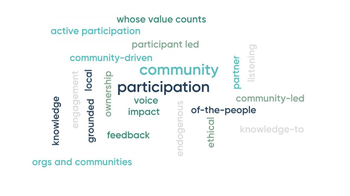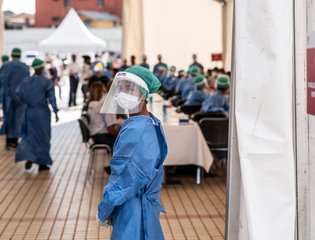Current discourse and literature on locally-led M&E covers a large range of issues.
Some are system-wide, such as: how M&E can support localisation, and decolonising evaluation. Others are calls for longer term and more flexible funding to push for locally led evaluation efforts, together with the idea of investing in learning partners from the Global South and evaluation processes that focus on grassroots perspectives. Still others cover technical aspects, like approaches and methods that are either the current practice of local actors and communities or serve to promote locally led solutions among international actors.
Equally interesting are debates around non-western approaches to evaluation and calls for alternative evaluation norms and standards, racial and culturally sensitive M&E approaches, hiring practices of national versus international evaluation experts, valuing and using local knowledge and experience, and the decentralisation of evaluation functions.
In this rich web of charged topics, it is easy to get lost and find yourself wondering, what role can I play in all this? How can I make sure that the focus of the M&E efforts that I am a part of are on the right things, done by the right people and for the right purpose?
Learning from others
To start peeling back some of the layers, ALNAP met with members on Locally-led M&E: Experience and practices from around the world.
We heard from four speakers. Fiona Cram, an independent consultant from Aotearoa, New Zealand, and co-chair of EvalIndigenous, shared with us 10 Questions Indigenous Communities Should Ask Evaluators, centred on the ethical responsibility of evaluators to recognise the importance of relationships when they work with Indigenous peoples, and how to avoid causing harm through the evaluative process.
Wiebke Meenenga, a monitoring, evaluation, accountability and learning (MEAL) advisor at the Start Fund, shared key findings from a report on Start Network's Community-led Approaches to Monitoring, Evaluation, Accountability, and Learning Research Grant, summarising the experience of community led MEAL projects in El Salvador, India, Jordan, Malawi, Tonga and Zimbabwe.
Rituu B. Nanda, participatory program advisor, South Asia, for the Global Fund for Children, shared her experiences from a development perspective on the power of appreciation and deep listening, using the SALT approach.
Dmytro Kondratenko, an M&E practitioner for Caritas and board member of the Ukrainian Evaluation Association, talked about the importance of cooperation between INGOs and local national associations to support ownership of the evaluation process.
The speakers and participants reflected on the importance of locally-led M&E and what it means to them. They discussed barriers and opportunities to incorporating locally-led M&E and its application in humanitarian contexts.

So what does locally-led M&E mean?
While there is a diverse range of interpretations and it can feel difficult to nail down, there are a few overarching themes that come through. For M&E to be locally led there should be ownership by local actors and communities over what is being measured, why and on what terms. These same stakeholders should be leading or meaningfully involved (depending on their desired degree of participation and what is feasible) in M&E activities at each stage.
Participants’ interpretations of the value and benefit of locally-led M&E in humanitarian contexts centred around community knowledge being closer to ‘the truth’ and positive change being dependent on local people having a real voice in their futures. They also identified the need to understand and develop a new perspective on the influence of our work on local peoples’ lives, as well as valuing existing relationships with communities alongside having the right capabilities for developing new relationships.
Participants believed communities are ready and willing to drive forward locally-led M&E and should be given the opportunity to control their needs and share their knowledge. It was also seen as more likely that locally-led M&E would lead to more sustainable and longer-term outcomes. Another idea was for neighboring communities to be connected, to share and learn from each other’s experiences. Using the right methods and approaches gives the community a voice to speak about their aspirations, rather than basing these on assumptions.
Finally, participants believed that with the current wider interest in and greater support for more locally and community-led humanitarian action, there is an opportunity to explicitly request funding and write locally-led M&E practices into project design and proposals to ensure they can be implemented. The Start Network has shown these kinds of initiatives are being funded. We need to see more incentives to inspire and promote further work on locally-led M&E.
On the other hand, barriers to locally-led M&E in humanitarian contexts were also identified. Importantly, one participant described the barrier in our own expectations, which are often centred on structured M&E that does not match communities' views, knowledge, and expertise. Several examples focused on time and priorities: the tension between the immediate objective to meet the most pressing needs and addressing community-led M&E, the limited time for implementation of humanitarian projects, versus what is needed to work directly with the communities. Participants also highlighted that time is especially limited when it comes to programme design with short turnarounds for submitting proposals.
Another problem voiced was community capacity to engage, both in terms of time and availability, and in managing the data in useful ways. One participant mentioned the limited time linked to the role of evaluators, suggesting there should be a mechanism for longer post-evaluation work with the community – an idea we could begin writing into our evaluation terms of reference.
Tokenism in 'community participation' was also highlighted, together with continuing to draw attention to what community participation even means (degrees of participation) and how learning is involved. Donors were seen as prescriptive when it comes to M&E, for example in setting the evaluation questions. One participant stated that: ‘In an ideal world we would do locally led design, implementation and monitoring but time, resources and budget and donor requirements are constraints to this.’ Others added that pre-set objectives and ‘scoped’ monitoring, as well as a lack of funding for locally-led M&E, all work against pushing this forward.
Making locally-led M&E more accessible
We can see there is a lot happening around locally-led M&E, but resources and initiatives are not always packaged in an accessible way for those of us who want to find out more and learn from a variety of experiences.
Academics and evaluation experts tend to use abstract language and reference theoretical frameworks, making it hard for practitioners to find their place in the conversation or quickly grasp how they can take steps to improve their own practice. A lot of the work is also centred around decolonisation of knowledge and academic research, shrouded in pretty inaccessible debates on power and positionality. For example, while I was doing background reading, I had to look up the terms ‘ontological’ and ‘epistemic’ several times (and I am still not sure I fully grasped their meaning!). At ALNAP we believe it is important to identify and make accessible the most important learning on locally-led M&E for humanitarian contexts.
How can we use the momentum and pressure building around localisation to propel locally-led M&E forward? How can we better acknowledge, learn about and apply what is already being done well? What power does locally-led M&E have in changing culture, mindsets and practice for an improved humanitarian aid system given that it touches on relevance, accountability, participation and so many other key factors?
While we chew over questions like these, ALNAP is preparing to review the literature and current practices of locally-led M&E, to support humanitarian practitioners to make sense of what is out there, learn from one another and apply it to their work.
Are you an ALNAP member representative or M&E focal point and would you like to join our community of practice to take part in these discussions? We want to continue to showcase initiatives from around the world to strengthen our collective learning and convene more events that support exchange on this important topic, so if you have something you want to share more widely, please reach out to me at: h.abulhusn@alnap.org
To check out some of what I have read on the topic - see
- Christian Aid’s Decolonising evaluation: whose value counts?
- Hur Hassnain’s Decolonizing Evaluation: Truth, Power, and the Global Evaluation Knowledge Base
- Global Change Center, Praxis UK, and Praxis Institute for Participatory Practices's Picturing the Evaluation Ecosystem: An executive summary of the Landscape Analysis on Equity Oriented Evaluation.


